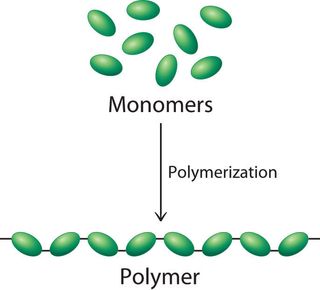Understanding Polymers: The Science Behind Versatile Materials
Understanding Polymers: The Science Behind Versatile Materials
Blog Article
Checking Out the Varied Applications and Benefits of Polymers in Different Industries
Polymers, with their diverse variety of residential or commercial properties and performances, have ended up being important in numerous industries, each reaping distinct advantages from their application. Polymers. From enhancing safety and performance in the automotive field to transforming medical tools in the medical care market, polymers play a pivotal role. Their eco-friendly nature is altering the landscape of sustainability techniques. As we delve into the midsts of polymers in electronics, we uncover sophisticated technologies, while their architectural honesty changes the world of building and construction and infrastructure. The pervasive influence of polymers across industries is a testimony to their flexibility and versatility, shaping the future of plenty of markets.
Automotive Field Applications
Polymers play a pivotal role in boosting the efficiency and resilience of numerous parts within the automobile industry. These flexible materials are thoroughly made use of in the manufacturing of different components, ranging from interior elements to under-the-hood applications. One popular use polymers in the vehicle industry remains in the manufacturing of light-weight elements. By changing standard metal components with polymer-based options, automobiles can accomplish improved fuel performance without compromising on strength or safety and security.

Healthcare Industry Advantages
In different medical care applications, the advantages of utilizing polymers are widely recognized for their diverse range of beneficial residential properties. Polymers play an important function in the health care sector because of their adaptability, biocompatibility, and cost-effectiveness. One of the primary advantages of polymers in health care is their capability to be customized to certain requirements, such as flexibility, toughness, and biodegradability, making them perfect for a large range of clinical applications.
Polymer-based products are extensively made use of in medical devices, such as catheters, implants, prosthetics, and drug delivery systems, due to their biocompatibility and capacity to resemble all-natural cells. These materials can decrease the risk of allergies or denials, boosting person security and results. Additionally, polymers are lightweight, making them suitable for wearable clinical gadgets and guaranteeing individual comfort.
In addition, polymers allow the advancement of ingenious therapy techniques, such as hydrogels for cells engineering and nanocomposites for targeted medicine delivery. Their convenience of processing and sanitation makes them important for keeping high standards of health in medical care settings. On the whole, the varied benefits of polymers add considerably to innovations in medical innovation and person care.
Ecological Benefits of Polymers

Moreover, polymers can add to power savings due to their lightweight nature. In sectors such as transport, light-weight polymer products can help in reducing gas usage and greenhouse gas emissions. Additionally, polymers can allow the advancement of energy-efficient products such as insulation materials that boost power preservation in structures.
In addition, polymers play a vital role in lowering water air pollution. For example, using polymer-based filtering systems can effectively remove toxins and impurities from wastewater, guarding water resources and environments. On the whole, the ecological benefits of polymers make them important assets in advertising sustainability and environmentally friendly practices throughout different industries.
Polymers in Electronic Devices and Innovation
Considering the enhancing demand for innovative and lasting remedies in contemporary sectors, the combination of innovative polymer modern technologies in the world of electronics and technology has actually become a pivotal method for driving effectiveness and performance. Polymers have actually reinvented the electronic devices sector by allowing the manufacturing of lighter, a lot more flexible, and sturdy electronic tools. From smart devices to clinical devices, polymers play a crucial function in enhancing product layout and functionality.
One significant benefit of polymers in electronic devices is their protecting residential properties, which help secure fragile digital components from environmental variables and electric disturbance. Additionally, polymers are necessary in the development of versatile display screens, wearable technology, and published electronics, offering unlimited opportunities for developing clever and interconnected devices.
Moreover, using polymers in digital product packaging has caused advancements in miniaturization and thermal administration, enhancing the total efficiency and dependability of electronic systems. As innovation proceeds to advance, the flexibility and versatility of polymers will undoubtedly drive better advancement in the electronic devices industry, shaping the future of modern technology.
Duty of Polymers in Construction and Framework
The assimilation of advanced polymer products in building and facilities jobs has transformed the means frameworks are designed and built in modern times. Polymers offer numerous benefits in the construction industry because of their flexibility, toughness, and cost-effectiveness. One vital duty of polymers in building is their use in finishings and sealants, giving defense versus environmental factors such as moisture, UV radiation, and deterioration. Furthermore, polymers are made use of in the production of light-weight and high-strength composite materials, enhancing the architectural honesty of structures while lowering general weight.
Additionally, polymers play an essential role in sustainable construction methods by allowing the development of energy-efficient structures. Protecting products made from polymers assist control interior temperatures, reducing the requirement for home heating and cooling systems and inevitably decreasing energy intake. Moreover, the use of polymer-based compounds in infrastructure jobs such as bridges and roadways improves their long life and decreases upkeep costs. Generally, the incorporation of polymers check over here in building and construction and facilities displays their significant effect on modern-day design practices.
Final Thought
In verdict, polymers play an important role in try these out numerous industries such as automotive, health care, environmental, electronics, and building. Their functional buildings make them valuable in creating innovative solutions and products. From boosting gas efficiency in vehicles to enhancing clinical tools, polymers supply countless benefits. In addition, their effect on reducing waste and promoting sustainability highlights their significance in contemporary applications. The extensive usage of polymers demonstrates their significant payment to progressing innovation and enhancing lifestyle.
Report this page